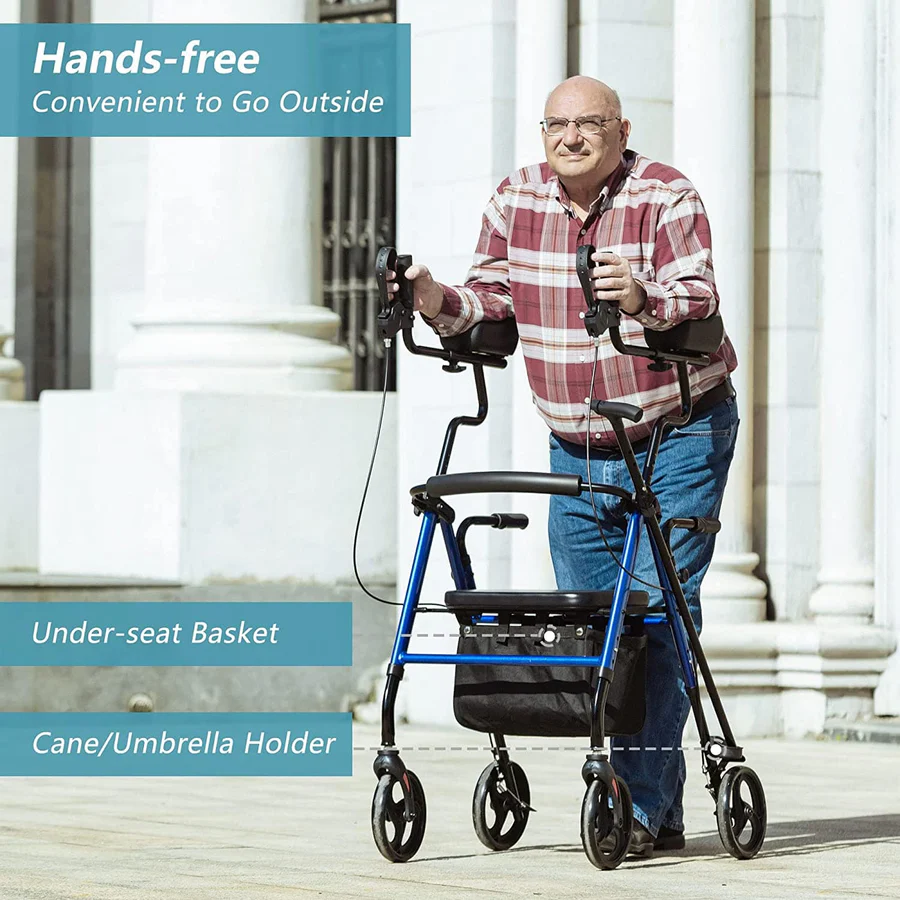Living with neurological disorders can really throw your balance off. Whether it’s Parkinson’s disease, multiple sclerosis, cerebellar ataxia, or other conditions that mess with your nervous system, keeping steady on your feet can feel like a daily challenge. That’s where Medical Rollators come in — they’re not just your ordinary walking aid; they can be a real help for balance and mobility.
So, can Medical Rollators actually improve balance for folks with neurological disorders? The short answer: yes, but there’s more to it than just grabbing any walker. Let’s chat about how these devices help and which types might work best for different needs.
Why Balance is a Big Deal with Neurological Disorders
Neurological disorders often affect the brain’s ability to coordinate muscle movements and sense your body in space. That can mean tremors, stiffness, weakness, or just feeling wobbly on your feet. Trying to walk or stand without support can sometimes feel like walking a tightrope.
Falls are a serious risk, and they can lead to injuries that make life even harder. That’s why maintaining balance isn’t just about staying upright; it’s about safety and independence.
How Medical Rollators Help with Balance
Medical Rollators offer a combination of support and mobility. Unlike regular walkers that just provide something to hold onto, rollators usually come with wheels, brakes, and often a seat. Here’s how they help:
- Stable Support: Medical Rollators create a steady base that you can lean on, giving your body more confidence. This is especially important if your neurological condition causes shaky hands or legs.
- Adjustable Features: Many rollators, like the Elenker upright walkers or the steel rolling walker, have adjustable handles that can be set to your height. This means you can stand tall and walk more naturally, which improves your balance.
- Brakes for Control: Wheels make moving easier, but they can also be a safety concern if they roll too fast. The brakes on Medical Rollators let you control your speed and stop when needed, preventing sudden slips.
- Lightweight Designs: For someone with limited strength or stamina, a heavy walker is just too much. That’s why options like the lightest walker with wheels are great — they’re easy to push without feeling weighed down.
- Terrain Adaptability: If you want to walk outdoors, uneven ground can be tricky. That’s where models like the Elenker all terrain walker shine. They’re designed to handle bumps and slopes without losing stability.
- Elbow Walkers for Extra Support: For those who need even more upper body support, elbow walkers can be a great choice. They offer sturdy armrests that take some pressure off your hands and wrists while still improving your balance.

Picking the Right Medical Rollator for Neurological Disorders
Not all Medical Rollators are created equal, especially when dealing with neurological disorders. Here are some tips on what to look for:
- Stability First: You want a rollator that feels solid and won’t tip easily. Wider bases or models with four wheels tend to be more stable.
- Easy to Maneuver: If your coordination is affected, a walker that’s too hard to steer can cause frustration or even falls. Lightweight options like the lightest walker with wheels can be easier to handle.
- Adjustability: Your height, arm length, and grip strength matter. Adjustable handles and brakes tailored to your comfort will make a big difference.
- Comfort: Features like padded seats or elbow supports can make longer walks easier. Elbow walkers help by supporting your forearms, giving your hands a break.
- Terrain Needs: If you mostly walk indoors, a standard steel rolling walker might do. But if you’re heading outdoors on sidewalks, parks, or uneven paths, the Elenker all terrain walker offers extra grip and durability.
- Weight Capacity: Make sure the rollator supports your weight safely, especially if you plan on using the seat for resting.
Real Talk: Using Medical Rollators Can Take Some Getting Used To
If you’re new to Medical Rollators, expect a short learning curve. You might feel awkward pushing and steering at first, but with practice, many people find that their confidence grows. The security they provide often encourages people to walk more, which can even improve muscle strength and balance over time.
Some folks worry about feeling “old” or “disabled” using a walker. That’s totally normal! But remember, Medical Rollators are about freedom, not limitation. They give you the chance to get out more, meet friends, and stay active — all of which are huge for your mental and physical health.
What About Safety Tips?
- Always check the brakes before you start walking.
- Wear good, supportive shoes.
- Avoid rushing — slow and steady wins the balance race.
- Make sure your rollator fits your height and weight properly.
- If possible, practice in a safe, open space before venturing outside.
- Consider consulting a physical therapist who can recommend the best model and show you how to use it safely.
So, can Medical Rollators improve balance in patients with neurological disorders?
Absolutely! While they don’t cure the underlying condition, they provide essential support that makes walking safer and less stressful. Models like the Elenker upright walkers, steel rolling walker, and the lightest walker with wheels are excellent choices depending on your needs. And if you’re tackling tougher terrain, the Elenker all terrain walker can keep you steady outdoors.
For those needing more arm support, the elbow walker is another option worth checking out. The key is finding a Medical Rollator that fits your body and your lifestyle.
In the end, using a Medical Rollator is about keeping you steady, confident, and moving forward — one step at a time.
